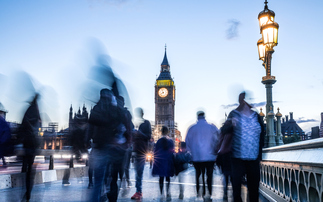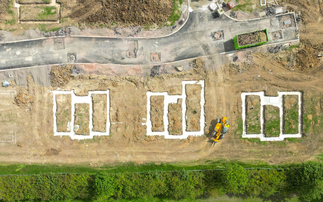Chaos reigns in Westminster - and for the green economy, and much else besides, the stakes could hardly be higher
I genuinely can't remember when it was. It may have been after the initial referendum result, or perhaps May's disastrous election result, or maybe one of the many auto-satirical attempts at a Cabinet reshuffle. But at some point during the past two years I texted a contact in Whitehall to ask how things were going. "The centre must hold," came the reply. "That bad?" I inquired. "The centre must hold," they repeated.
There is a lot to be said in politics and life for doing what it takes to keep the show on the road. Sometimes delay is fatal and a willingness to take tough decisions is what is required. But sometimes a fudged agreement, a messy compromise, a deferred row, can buy time and allow steady, incremental progress to continue. The trick, of course, is telling the difference between the two.
David Cameron gambled with a referendum to try and resolve some self-indulgent internal party difficulties and unleashed the biggest crisis since the Second World War. May - backed by some of the worst advice from some of the worst people - initially attempted to govern along similarly combative lines, backing herself into a corner made of her own ultimatums and red lines, before eventually realising she risked an economic catastrophe unprecedented in peacetime. As such she belatedly recognised her primary duty as Prime Minister is to maintain the economic and physical security of the British public. She accepted the wisdom of a flawed compromise that would secure her primary goal of avoiding economic disaster. No deal was always worse than a bad deal. One of the many tragedies is it took so long to accept this fact. The centre must hold.
This is the crucial calculation as the low drama of resignations and plotting swirls around Westminster. As Newsnight's Nicholas Watt reported this morning, Number 10 was fully expecting resignations. The plan is to tough it out, hopefully win a confidence vote if necessary, and hand MPs the responsibility to approve or reject the agreement knowing that voting down the deal risks unleashing a level of chaos that would jeopardise livelihoods and even lives.
The risks to the green economy contained in this calculation are both obvious and acute. They include the 'no deal' technical challenges sketched out by the government in recent months, which involve fleets of diesel generators being shipped to Northern Ireland, utter confusion for the emissions trading scheme, and immense new trade barriers covering everything from chemicals and electric vehicles to renewable energy and consultancy services. But these risks also extend to the precious political consensus on the importance of climate action and environmental protection that currently makes the UK almost unique amongst Anglo-Saxon countries.
Make no mistake, the cabal of around 60 Conservative MPs who have driven us - over the course of decades - to this point are almost united in their desire to roll back environmental protections, dilute green standards, and engineer a low tax, high carbon pollutocracy. The flurry of resignation letters today, not to mention the previous departures of Boris Johnson and David Davis, have all dog whistled their support for this world view. Their concerns over a loss of the sovereignty they previously insisted we did not actually have may be legitimate, and therte is no doubt the relegation of the UK to a position of rule-taker is one of the most unfortunate (and predictable) consequences of Brexit. But the underlying desire to secure the freedom to eviscerate the UK's environmental and workplace regulatory framework is utterly transparent.
Those Conservative moderates who insist the relatively small number of parliamentarians who wish to advance such an agenda will never secure the levers required to do so underestimate the raw power games at play here.
It is in this context that the Withdrawal Agreement has to be seen. It contains numerous fundamental flaws. It would still result in trade barriers. It constitutes an historic loss of influence for the UK. It risks indefinite constitutional uncertainty and threatens the union. Most of all it will likely relegate the big existential issues of decarbonisation and climate risks and the fourth industrial revolution to a side-show for much of the next decade.
But it would cement high environmental standards and principles into the UK body politic for the foreseeable future. It would provide the country with the freedom to set its own green path for agriculture, land use, and fisheries. It would force a recalcitrant Treasury to back a robust and authoritative green watchdog. It would give Ministers the space to divert at least some of their attention to other issues. Most of all it would avert an economic catastrophe that would set the UK's burgeoning green economy back years.
The reasonable response to this optimistic analysis, is what about UK sovereignty? Why should the UK be a rule-taker?
But this is the binary choice Cameron and the Brexiters unleashed. The only options were always 'vassalage or chaos'. It was soft Brexit and a loss of influence or hard 'no deal' Brexit and economic disaster.
And besides, it will be a funny sort of vassalage. As was always the case Parliament will remain sovereign. If it backs the Withdrawal Agreement the UK will enter willingly into the new arrangements with the EU. If they want to tear up the agreement in the future and pursue their regulation torching, fossil fuel burning agenda, then all the Hard Brexiters have to do is win a mandate and a majority in parliament and live with the economic and political consequences that will result from severing ties with our largest trading partner. It's called democracy - they are meant to be fans of it.
The harsh, unblinking reality is there are no good options left. The preening narcissism and utter cowardice of those who would resign after, and not before, nominally backing an agreement. The intellectual dishonesty of those who have decried any compromise agreement, while never once proffering an even vaguely credible plan of their own. The unending mendacity of those who know that their supposedly superior route forward involves mountainous new trade barriers, economic chaos, and the unilateral tearing up the Good Friday Agreement in pursuit of mystical but deliberately undefined sunlit uplands, but lack the nerve to spell out the consequences of their actions. The self-interested inaction of Her Majesty's Opposition. It has all driven us to a position where the only options are a fudge that should at least avert economic disaster and minimise the risks to environmental progress or a roll of the dice that may result in a divisive reversal of Brexit, but could equally herald food shortages in the short term and the UK's conversion into a high carbon tax haven in the longer term.
Faced with these choices, the case for doing what it takes to keep the show on the road - for securing an imperfect agreement that finally allows at least some attention to be diverted to the big issues of climate change, decarbonisation, and the construction of a modern, clean, and healthy 21st century economy - is compelling.
At the time of writing Business Secretary Greg Clark is wrestling with a legal ruling that suspends the UK's capacity market, while also preparing to give a high profile speech on the future of the UK's clean energy plans. Environment Secretary Michael Gove is mulling his political future, just days ahead of the release of a critical new waste and resource strategy and in the midst of a critical battle with the Treasury on the future of the UK's environmental targets. And Prime Minister Theresa May is presumably not giving the slightest thought to the crucial round of UN climate talks next month.
It would be nice, but probably delusional, to think that at some point the UK's political elite can get back to the important business of governing and providing businesses, investors, and the wider public with the economic and environmental security that should be their first priority. The green centre must hold.











